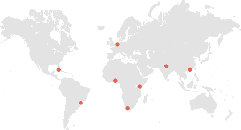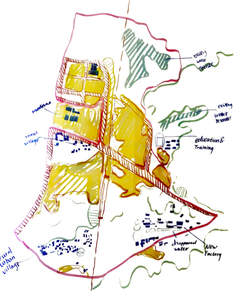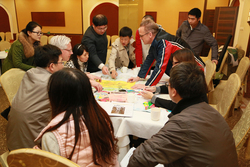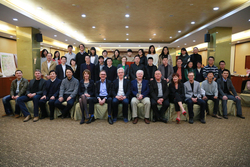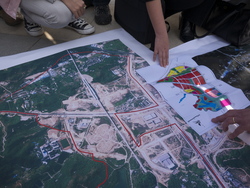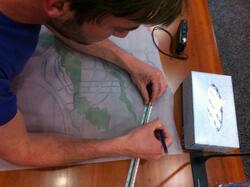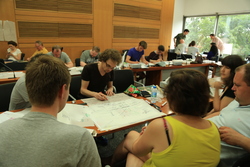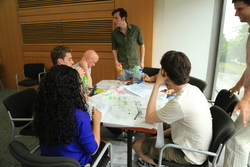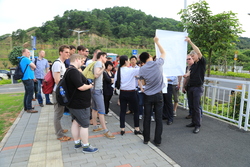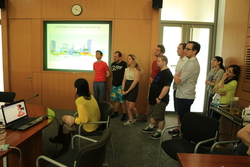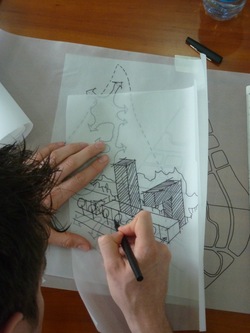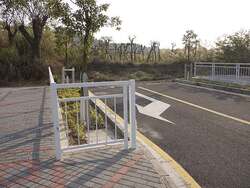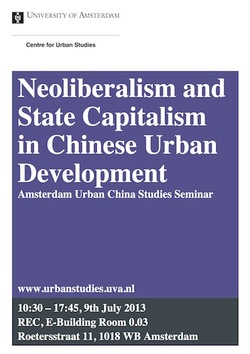Shenzhen is a city that has been raising eyebrows for years, because of its fast development and exceptional position. However, its urbanization process also causes many problems. In Shenzhen, the New New Towns research project will focus on the city’s urban renewal in relation to the existing landscape, industry and population. New New Towns will research three sites in order to propose alternative design strategies in regard to the ecological, economic and social sustainable future of these specific areas and Shenzhen as a whole: ecological sustainability is related to Guangming New Town (a new Low Carbon City in Bao’an District), economic sustainability is related to Luohu District (the first district within the Special Economic Zone) and social sustainability is related to Da Lang District.
Each site is connected to a collective of universities or knowledge institutes. INTI collaborates locally with the Chinese University of Hong Kong, Hong Kong University, China Development Institute, Shenzhen Center for Design and architecture offices Urbanus and NODE.
In order to define the research and design agenda for Dutch and Chinese students, INTI organized a three-day expert meeting (September 22-25, 2012). The participants included:
Linda Vlassenrood (Program Director INTI),
Stephen Read (Associate Professor, Chair of Spatial Planning and Strategy – Delft University of Technology),
Diego Sepulveda Carmona (Assistant Professor, Chair of Spatial Planning and Strategy – Delft University of Technology),
Qu Lei (Researcher, Chair of Spatial Planning and Strategy – Delft University of Technology),
Arnold Reijndorp (Professor of Social-economic and Spatial Development of New Urban Areas, Centre for Urban Studies – University of Amsterdam),
Henk Meijer (Project Director Sustainable Spatial Planning – Municipality of Almere),
Harry Zondag (Strategic Advisor Spatial Planning – Municipality of Almere),
Ronald Wall (Economic Geographer – Institute for Housing and Urban Development Studies),
Gaston Remmers (Chair Eco-effective Entrepreneurship in Urban Environments – CAH Almere University of Applied Sciences),
Juan Du (Director of Master of Architecture Program and Assistant Professor – Hong Kong University),
Huang Weiwen (Director Shenzhen Center for Design and Deputy Chief Planner, Urban Planning and Land Resource Commission of Shenzhen Municipality),
Tat Lam (Chinese University of Hong Kong – Director Urbanus Research Bureau),
Travis Bunt (Chinese University of Hong Kong – Director Urbanus Hong Kong),
Doreen Liu (Chinese University of Hong Kong – Principal NODE Architecture & Urbanism),
Li Jinkui (Professor Institute of Urbanization – China Development Institute).
The expert meeting was made possible with support from the Embassy of the Kingdom of the Netherlands in China.
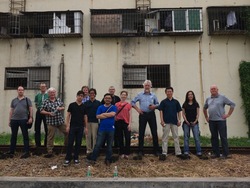
The first 3-day design workshop for the development of Guangming New Town in Shenzhen took place between January 14 - January 16, 2013 in collaboration with the Shenzhen Center for Design. The workshop brought together eight Dutch and nine Chinese designers and academic scholars who are specialized in strategic planning, ecology, green architecture, economics, sociology, and landscape development.
Other participants included representatives from the Guangming Urban Planning Bureau and domestic well-known enterprises such as Zhaoshang, Huaqiang and Xunteng.
Guangming New Town is positioned to become a showcase low-carbon city in Shenzhen. The design workshop was focused on the Gateway Area of the New Town, where the station for the Guangzhou-Shenzhen-Hong Kong express train is located. The design workshop concentrated on analyzing the potential of existing conditions of the area, identifying the unique selling point for future development and defining the implementation strategies for the urban planning. The workshop produced a series of strategy suggestions and design proposals. The results have been synthesized into “seven points of agreement”. Each point includes a critical review of the current urban plan and future recommendations for connecting local qualities with global opportunities, economic development potentials, landscape development models, new modes of transportation and implementation tools.
The experts emphasized that Guangming New Town should position itself more ambitiously in the global viewpoint by further exploring its local qualities and potentials through experimentation. Research and design proposals were done on intensifying knowledge-intensive economic sectors and industrial activities in ICT, medical science, business services and transportation services. Furthermore, recommendations were made about how to integrate the industry and further develop the HUB area in regard to infrastructure, mixed-use program, public space and green development. Finally, it was suggested that the development of the Gateway Area needs a shared ambition by public and private stakeholders and a strategic plan with urban development guidelines to phase, monitor and evaluate the quality of the development of this area on a high level.
The workshop was moderated by Linda Vlassenrood (INTI) and Huang Weiwen (director Shenzhen Center for Design). Students from the Shenzhen University and Delft University of Technology supported the experts.
DUTCH PARTICIPANTS:
1. Ronald Wall (Economic Geographer – Institute for Housing and Urban Development Studies)
2. Gaston Remmers (Chair Eco-effective Entrepreneurship in Urban Environments – CAH, Almere University of Applied Sciences)
3. Ivonne de Nood (Landscape Architect - City of Almere)
4. Harry Zondag (Strategic Advisor Spatial Planning - City of Almere)
5. Wiebe Oosterhof (Advisor Strategic Urban Planning - City of Almere)
6. Arnold Reijndorp (Professor of Social-economic and Spatial Development of New Urban Areas, Centre for Urban Studies – University of Amsterdam)
7. Leo Versteijlen (Director, co-owner and co-founder of SITE urban development)
8. Michelle Provoost (Director of International New Town Institute, co-founder of Crimson Architectural Historians)
CHINESE PARTICIPANTS:
1. Huang Weiwen (Director Shenzhen Center for Design)
2. Tat Lam (Chinese University of Hong Kong – Director Urbanus Research Bureau)
3. Su Yunsheng (Professor, Shanghai Tongji University Urban Planning & Design Institute)
4. Yang Xiaochun (Associate Professor, School of Architecture and Urban Planning, Shenzhen University)
5. Yang Hui (Head of Guangming Bureau of Transportation, Traffic Management Division)
6. Huang Gu (Director - Northwest Municipal Engineering Design Institute Co., Ltd, China)
7. Lin Wusheng (Senior engineer - China Merchants Property Development Planning Design Center)
8. Liu Sheng (Doreen) (Founder of NODE architectural office)
9. Peng Shuiqing (Director of Urban Planning Bureau – Guangming New Town)
10. James Hong (Associate Professor, School of Architecture and Urban Planning, Shenzhen University)
This event was made possible through contributions from The City of Almere and Guangming New Town.



